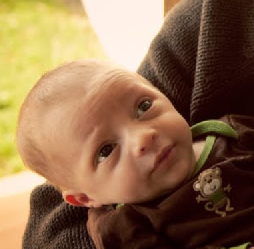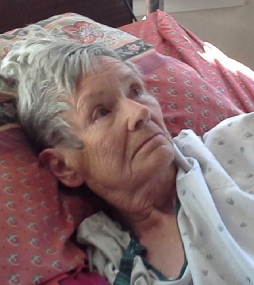
I want to extend my thinking in the journal entry Whose truth? Whose journey? First a reprise:
I appreciate Margaret senior's comment on Eric's journal entry yesterday – "that within the peace is a powerful, special experience – unlike any other experience. These days and the experience will stay with you forever." Although it is surely true that, as Eric says, referencing the wisdom of one of the hospice people, "Oma [is] negotiating an incredible, unfamiliar and unknowable (by us) journey," it is also true that the family with her here, each of us, is also on a journey with her. Like Margaret at her own mother's death, I have found with Doris powerful, special experiences. These entail my interpretation of Oma's own experience, of course, and so are inevitably subjective. My readings. But I want to note them briefly here.
The first came with her fierce and sternly steady refusal to take food or water Saturday night, a refusal also to recognize me or even our friendly table-mate Helen. Her eyes were open and she kept their gaze averted from us. I sensed a great power and determination in her, and could only wonder in a kind of fearful awe whence it came.
The second came yesterday morning early when Eric and I stood beside her as she came out of her steady resting state of eyes closed, face generally relaxed and left arm often restlessly moving through its range. All at once she was quite awake and still, steadily gazing up and slightly left towards the ceiling, definitely not to us when we would dip our heads into her gaze. She held this gaze for a minute or two, maybe three,and then turned her head a bit to the right and continued her intense attention to something far beyond our ken. And this shift repeated slowly for a total of perhaps ten minutes. In all this time her facial expression never varied from an amazing attentiveness, not anxious or fearful at all, but more submissive or passive. Lips relaxed and straight, no frown, eyes very wide open. My summary label would be The Lesson. To me, she was attentive to some teaching, some master far beyond our limited vision down here in space-time. And this lesson was of an ultimate seriousness, beyond surprise, awe or amazement. It was real. It was really real, and I knew in my bones that I ought to pay close attention to the fact of this transcendence of my ordinary life. This should change how I live.
So how should it change my life? And why?
A first thought many have who know of Doris’s near-death experience at age seven, is that she must be gazing through the famous tunnel leading to the light where her loving family that has gone before awaits her this time for good.
The look on her face, though, is not of a person witnessing such a promise of joy or bliss. And neither do I see signs of fear or anxiety. Her face is rather emotionless, but brimming with strong discernment. Before, I called it “attentive to some teaching, some master far beyond our limited vision down here in space-time.” Of course I don’t see a teacher or master, nor do I even have a candidate for such a person in the hereafter. But that’s how she looks to me.
Surely it is death she is seeing. But she is not afraid, and also not enraptured or fascinated. She is alert, aware and entirely absorbed, seeing neither Eric nor me, nor distracted by anything in the room. This fact of her being is now ultimately important and absorbing. Alongside it, our love, our tears and our fears – or her own for us or for herself – these lack all significance to her right now. She is encountering something entirely other.
It turns out that there was certainly another time for Doris like this. At her birth. In an address called Death: Profound Mystery and Master Teacher , I listened to Dr. Betsy MacGregor say this:
, I listened to Dr. Betsy MacGregor say this:
In spending time in the delivery room a lot I saw how it’s no small matter to enter this world, to be squeezed down this narrow channel and – it’s an intense process – and babies when they first arrive spend a little while in this interesting state called the quiet alert state – it’s fun to see them when they’re in this state – because they’re just lying there, these newly arrived human beings like this – their eyes roam all around. They’re very awake, and it’s like they’re – we can all see on their faces the – I don’t know what it is, some mixture of surprise, awe… pleasure. And then they usually fall asleep.
The twin alert states of birth and death for Doris burn like sunlight through the fog of my school-learned, habitual skepticism and stand as lucid beacons of a truth too plain any longer to dodge, evade or deny. Our journey didn’t start, and won’t end, here on Earth. Foolish to argue the whence and wither of that, but wise to sit quietly with its truth for awhile.
Doris’s dying offers me two beacons as well. One is the illumination of the twin alert states, and the other is the example of her fierce and powerful decision to end her state of narrowed scope and painful dependency in the long-term-care wing by refusing to eat or drink. The image of her glaring eyes and down-turned mouth as long as we kept trying to feed her will surely never leave me. I saw again there the magnificent womanly power and resiliency that had overwhelmed me when we were young and in Paris. And as then, so now, but with a respect more like awe and my own determination to live by her example.
Namaste, Doris.

In retrospect, ten minutes is too long. But it seemed like a very long time. It might have been only five minutes, but it felt like ages as we stood at her bedside after at least five days of her only lying there, moving her arm restlessly, breathing more rapidly as time went on. And then suddenly this total change. Out of nowhere. Spine-shivering.
| The Fifth Remembrance 1 |
| The Fifth Remembrance 2 |
| The Fifth Remembrance 3 |
| Dr. Block and Isys 1 |
| Dr. Block and Isys 2 |
| Dr. Taylor and near death 1 |
| Doris's Death |
| Whose journey? Whose truth? |
| Whose journey? Whose truth? |


